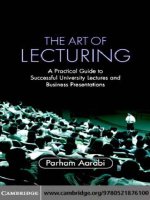0521873576 cambridge university press hegels phenomenology of spirit an introduction apr 2008
Bạn đang xem bản rút gọn của tài liệu. Xem và tải ngay bản đầy đủ của tài liệu tại đây (857.08 KB, 182 trang )
P1: KNP
9780521873574pre
CUFX277/Krasnoff
978 0 521 87357 4
March 11, 2008
This page intentionally left blank
i
11:37
P1: KNP
9780521873574pre
CUFX277/Krasnoff
978 0 521 87357 4
March 11, 2008
H E G E L’ S PH E N O M E N O LO G Y
O F S PI R I T
This book introduces Hegel’s best known and most influential work,
Phenomenology of Spirit, by interpreting it as a unified argument for
a single philosophical claim: that human beings achieve their freedom through retrospective self-understanding. In clear, non-technical
prose, Larry Krasnoff sets this claim in the context of the history of
modern philosophy and shows how it is developed in the major sections of Hegel’s text. The result is an accessible and engaging guide to
one of the most complex and important works of nineteenth-century
philosophy, which will be of interest to all students and teachers working in this area.
larry krasnoff is Associate Professor, Department of Philosophy,
College of Charleston. He is co-editor with Natalie Brender of New
Essays on the History of Autonomy (2004).
i
11:37
P1: KNP
9780521873574pre
CUFX277/Krasnoff
978 0 521 87357 4
March 11, 2008
ii
11:37
P1: KNP
9780521873574pre
CUFX277/Krasnoff
978 0 521 87357 4
March 11, 2008
cambridge introductions to key
philosophical texts
This new series offers introductory textbooks on what are considered to
be the most important texts of Western philosophy. Each book guides the
reader through the main themes and arguments of the work in question,
while also paying attention to its historical context and its philosophical
legacy. No philosophical background knowledge is assumed, and the books
will be well suited to introductory university-level courses.
Titles published in the series:
d e s c a rt e s’s m e d i tat i o n s by Catherine Wilson
w i t t g e n s t e i n’s p h i l o s o p h i c a l i n v e s t i g at i o n s
by David G. Stern
w i t t g e n s t e i n’s t r a c tat u s by Alfred Nordmann
a r i s t o t l e’s n i c o m a c h e a n e t h i c s by Michael Pakaluk
s p i n o z a’s e t h i c s by Steven Nadler
k a n t ’s c r i t i q u e o f p u r e r e a s o n by Jill Vance Buroker
h e i d e g g e r ’s b e i n g a n d t i m e by Paul Gorner
h e g e l ’s p h e n o m e n o l o g y o f s p i r i t by Larry Krasnoff
iii
11:37
P1: KNP
9780521873574pre
CUFX277/Krasnoff
978 0 521 87357 4
March 11, 2008
iv
11:37
P1: KNP
9780521873574pre
CUFX277/Krasnoff
978 0 521 87357 4
March 11, 2008
H E G E L’ S PH E N O M E N O LO G Y
O F S PI R I T
An Introduction
L A R RY K R A S N O F F
College of Charleston
v
11:37
CAMBRIDGE UNIVERSITY PRESS
Cambridge, New York, Melbourne, Madrid, Cape Town, Singapore, São Paulo
Cambridge University Press
The Edinburgh Building, Cambridge CB2 8RU, UK
Published in the United States of America by Cambridge University Press, New York
www.cambridge.org
Information on this title: www.cambridge.org/9780521873574
© Larry Krasnoff 2008
This publication is in copyright. Subject to statutory exception and to the provision of
relevant collective licensing agreements, no reproduction of any part may take place
without the written permission of Cambridge University Press.
First published in print format 2008
ISBN-13 978-0-511-40893-9
eBook (EBL)
ISBN-13 978-0-521-87357-4
hardback
ISBN-13 978-0-521-69537-4
paperback
Cambridge University Press has no responsibility for the persistence or accuracy of urls
for external or third-party internet websites referred to in this publication, and does not
guarantee that any content on such websites is, or will remain, accurate or appropriate.
P1: KNP
9780521873574pre
CUFX277/Krasnoff
978 0 521 87357 4
March 11, 2008
Contents
Preface
Acknowledgments
page ix
xv
1 Introduction
1
Hegel’s life and work
History and justification
Plan of the work
3
10
15
2 Knowledge
18
Rationalism and divine authority
Empiricism and natural authority
19
24
3 Freedom
32
Physical and moral freedom
The artificiality of norms
The value of autonomy
32
35
41
4 Idealism
45
Freedom and rationality
Self-grounding
Hegel’s proposed solution
46
53
56
5 Method
62
Contemplative and active subjectivity
The free subject and its culture
The method of skepticism
Philosophy as retrospective
Stages of the argument
6 Theory
62
67
70
73
75
77
Sense-certainty
Perception
The inverted world
From theory to practice
77
80
85
90
vii
11:37
P1: KNP
9780521873574pre
CUFX277/Krasnoff
978 0 521 87357 4
viii
March 11, 2008
Contents
7 Practice
Desire
Master and slave
Freedom without content
From agency to culture
8 Culture
Two senses of culture
The Greek world and its fragmentation
Excursus 1: Antigone
Excursus 2: Religion
Modernity as reconciliation
Excursus 3: Enlightenment
Excursus 4: Morality
Review of the argument
9 Results
Retrospection and justification
Hegel in the history of philosophy: a review
A crucial ambiguity
Further reading
Index
93
95
101
106
110
113
117
120
122
128
134
135
140
146
148
149
153
156
161
163
11:37
P1: KNP
9780521873574pre
CUFX277/Krasnoff
978 0 521 87357 4
March 11, 2008
Preface
I have long seen a need for a short introduction to Hegel’s Phenomenology
of Spirit, but at the same time I have been acutely aware that such an introduction faces severe obstacles. The first of these are immediately obvious
to anyone who even thumbs through the book: the work is especially long,
and it is written in a dense, abstract language that seems as if it could be
comprehensible only to Hegel himself. For all of that, the work is deeply
connected to themes in the history not just of philosophy but also of religion, politics, and literature, and it has been highly influential in all of those
areas. One would expect that a proper introduction to any philosophical
work would have at least something to say about its terminology, its particular arguments, its historical background, and its subsequent historical
influences. But in this case doing justice to even one of these topics would
lead to a prohibitively long book.
The situation is only partially helped by a decision to focus on a specifically philosophical introduction, by which I mean to focus specifically on
what the work can be said to attempt, and to accomplish, as an argument.
That sort of focus relegates the matters of historical background and influence, and even the issue of terminology, to supporting roles: the task is to
convey, in clear language accessible to contemporary readers, what Hegel’s
main claims are meant to be. But even this particular task is complicated
by the style and the diverse influences of the work, and by its sheer length.
Different sorts of philosophers have different standards for what constitutes
a philosophical argument, and indeed Hegel remains a kind of litmus test
for this question, since the reception of his work was crucial to the still tense
division between “analytic” and “Continental” philosophy. So it is virtually
impossible to identify Hegel’s most important arguments in a way that will
satisfy every philosopher’s conception of what constitutes a philosophical
argument – especially when many philosophers have long thought that
Hegel abandoned argumentation entirely. And there is no way to identify
those most important arguments without ignoring some sections of Hegel’s
ix
11:37
P1: KNP
9780521873574pre
CUFX277/Krasnoff
x
978 0 521 87357 4
March 11, 2008
Preface
text, each of which is made up of dozens of sub-arguments and narrative
twists. Given the length of the Phenomenology, this kind of introduction
cannot be a commentary like one of the many already in print, the sort
of book that takes itself as obligated to discuss every section of Hegel’s
text.1 That sort of approach would lead, once again, to a prohibitively long
book.
In navigating my way through these difficulties, I have tried to focus
on the context in which an inexperienced but philosophically interested
student is likely to encounter Hegel’s Phenomenology for the first time.
That context is likely to be a class for advanced undergraduates or beginning
graduate students, a class that treats Hegel not on his own but in the context
of a larger survey, perhaps of Kant and German idealism, but more likely of
nineteenth-century or Continental philosophy. Such classes can assign only
selections from the Phenomenology to occupy the three to four weeks that
can typically be devoted to Hegel. Usually these sections come from the
first parts of the work: the Preface, the Introduction, and the chapters on
“Consciousness” and “Self-Consciousness.” After that, there tends to be a
good deal of divergence about what to read. And so my close argumentative
reading of Hegel’s text concentrates on the sections of the work through
the chapter “Self-Consciousness” (which ends with the discussion of the
Unhappy Consciousness). In this book, Chapter 5 is intended to be read
alongside Hegel’s Preface and Introduction, Chapter 6 is intended to be
read alongside his chapter on “Consciousness,” and Chapter 7 is intended
to be read alongside his chapter on “Self-Consciousness.” After that, in
Chapter 8, I offer textual discussions only of selected sections, those that I
suspect are most likely for instructors to assign. But these discussions are
presented merely as excurses, which readers can feel free to either examine
or ignore. In Chapters 8 and 9, I concentrate mainly on the larger question
of what the later sections of the book are intended to accomplish. The
idea is not just to keep the textual discussion to a manageable length, to
avoid writing a 400-page commentary, but also to present the work in
1
For just two recent examples, see Terry Pinkard, Hegel’s Phenomenology: The Sociality of Reason
(Cambridge University Press, 1994); and H. S. Harris, Hegel’s Ladder: A Commentary on Hegel’s
Phenomenology of Spirit (Hackett, 1997). Nor, if it is to concern only the Phenomenology, can this be a
book – like the works of Charles Taylor, Robert Pippin, and Michael Forster – that attempts to lay out
Hegel’s project in the Phenomenology and to then relate its status to the Logic and to Hegel’s idea of a
philosophical system. See Taylor, Hegel (Cambridge University Press, 1975); Pippin, Hegel’s Idealism:
The Satisfactions of Self-Consciousness (Cambridge University Press, 1989); and Forster, Hegel’s Idea
of a Phenomenology of Spirit (University of Chicago Press, 1998). I discuss some of these issues in
Chapter 1, but only briefly.
11:37
P1: KNP
9780521873574pre
CUFX277/Krasnoff
978 0 521 87357 4
Preface
March 11, 2008
xi
the sort of context that professors are most likely to assign it to beginning
readers.
To give focus to this study, I have also chosen to frame my discussion
around a single theme: Hegel’s defense of modernity as the expression and
even the realization of human freedom. The historical emergence of this
theme is the subject of Chapters 1 through 4. It is often pointed out that
Hegel is trying to provide a new defense of modern intellectual, cultural,
and social institutions, one that makes an explicit appeal to the history
and development of those institutions. This kind of historical account is
explicitly at odds with the traditional philosophical understanding of standards of truth and rationality as essentially timeless, and it also appeals to
cultural considerations (to literature, to religion, and to political developments) that have traditionally been considered outside the boundaries of
purely rational argumentation. So how is a historically grounded argument
supposed to work as a philosophical justification? How can Hegel argue, as
he clearly does, that he has given a full rational justification of the modern
idea of freedom, and also that his account is explicitly historical?
The assumption behind this study is that Hegel’s answer to these questions can be found in his distinctive account of human subjectivity, which
is intended to combine the notions of freedom, rationality, and historical reflection in a very special way. On the reading I will present, the
Phenomenology is an argument for the claim that the essential nature of
subjectivity – what it is to be a human being – is to seek self-knowledge
through a reflection on one’s past. On this kind of view, rationality is historical because human beings come to understand themselves historically,
and history is rational insofar as it tends toward institutions that affirm the
value of this kind of subject, of this kind of human being. The second, substantive task of this book – which should be of interest even to those who do
not need it for pedagogical purposes – is to show that the Phenomenology of
Spirit can and should be read as a philosophical defense of these claims. On
this reading, both the opening, “philosophical,” chapters of the book and
the subsequent “historical” chapters should be seen as part of a continuous
argument for a certain view of subjectivity: not just an argument that our
modern conception of subjectivity is essentially connected to culture and
history, but also an argument that this historical conception of subjectivity
is essentially connected to the enterprise of rational justification.
Behind all of this is the thought that a philosophical introduction to
any work, Hegel’s included, should not just identify but also exemplify
the sort of argumentation that makes the work specifically philosophical.
11:37
P1: KNP
9780521873574pre
CUFX277/Krasnoff
xii
978 0 521 87357 4
March 11, 2008
Preface
That is, a philosophical introduction to Hegel should not just describe
his position, but should also try to understand it as a live option in some
real and ongoing philosophical debate. My hope is that by narrowing the
focus of the book to a particular issue – Hegel’s historical defense of his
historical conception of subjectivity – the book gains in comprehensibility
and philosophical focus what it necessarily lacks in comprehensiveness.2
Faced with the problems posed by the length and the sprawling influences
of the Phenomenology, I have quite deliberately abandoned the thought of
a fully comprehensive introduction.3 There is much in Hegel that I will be
2
In my discussions, I try to avoid Hegelian jargon as much as possible. As the argument unfolds, I of
course try to explain what Hegel’s terms mean, and to connect my own claims to specific formulations
in his text. But I have not tried to provide any sort of systematic treatment of, or even introduction
to, Hegel’s vocabulary. This is not, therefore, a particularly good book for teaching someone to “talk”
Hegel, to acquire the sort of technical facility that would, say, allow that person to open the Logic
to a random paragraph and begin reading with fluidity and confidence. My view is that this kind
of special competence is too remote and too impractical an aim for most readers of this book, and
especially for students who are initially encountering Hegel for just a few weeks. The barriers posed
by Hegel’s terminology and writing style are so great that they demand something like the opposite
approach: showing that it is possible to talk about Hegel in language accessible to any decent student
of the humanities. What new (and even many old) readers of Hegel most need is the reassurance
that his seemingly impenetrable formulations really do amount to claims that can be stated clearly
and plausibly, and relate clearly and plausibly to familiar debates in philosophy. And they need to
know that the sprawling and idiosyncratic form of the work really can be understood as serving a
larger and understandable purpose. In short, my view is that in the case of Hegel, especially, a study
like this one should be a lifeline of clarity dropped into what can seem like a hostile sea of obscurity:
what the reader of Hegel needs to cling to, at every moment, is the thought that his work really
does have a clear philosophical point. Only by believing that can the reader of Hegel believe that his
philosophy is really worth reading, and that the technical competence needed to read him fluently
might eventually be worth acquiring.
The emphasis on the unity and larger purpose of the work means that I will not be able to
engage in any extended discussions of Hegel’s contributions to particular fields of philosophy, such
as epistemology or ethics, though I will have much to say that is relevant to such fields. The plan to
read the text as a specifically philosophical argument will also neglect Hegel’s vast influence on other
areas of culture, such as history, religion, or literature; though I will again touch on matters relating
to all of these, I will not be able to do anything like justice to Hegel’s contributions. Together with the
size, the complexity, and the intellectual range of the Phenomenology, these commitments mean that
I will inevitably be neglecting interesting and important themes in the work. I would not claim that
my particular emphasis on Hegel’s conception of subjectivity as retrospective self-knowledge comes
anywhere close to providing a full reading of the work. But I do believe that focusing specifically on
this theme will best allow a reader to make philosophical sense of the entire work in a manageable
amount of time.
3
That makes this book different from the short introductions to Hegel offered by Peter Singer or
Frederick Beiser, which take themselves as obligated to discuss every important aspect of Hegel’s life
and work, at least very briefly, and which of necessity lose some of their philosophical focus. See
Singer, Hegel: A Very Short Introduction (Oxford University Press, 2001); and Beiser, Hegel (Routledge,
2005). Beiser’s account is much richer, but it is also longer and more general than what I aim for here.
The book is probably closest in spirit to the shorter versions of Taylor’s and Harris’ books, but just
because they are abridgments, it is hard to read them without feeling that one is missing something of
the argument. See Taylor, Hegel and Modern Society (Cambridge University Press, 1975); and Harris,
Hegel: Phenomenology and System (Hackett, 1995).
11:37
P1: KNP
9780521873574pre
CUFX277/Krasnoff
978 0 521 87357 4
Preface
March 11, 2008
xiii
unable to discuss here: my goal is not to “cover” Hegel but rather to allow
him to speak in full voice in recognizable and continuing debates over such
matters as freedom, rationality, and the nature of rational justification. The
results, I hope, will be a kind of clarity, a lack of clutter, and a willingness
finally to listen to his position, that are sorely needed when encountering
Hegel at any level.
11:37
P1: KNP
9780521873574pre
CUFX277/Krasnoff
978 0 521 87357 4
March 11, 2008
xiv
11:37
P1: KNP
9780521873574pre
CUFX277/Krasnoff
978 0 521 87357 4
March 11, 2008
Acknowledgments
It is always appropriately humbling to recognize how much a book owes
to the work of others. At Williams College and then at Johns Hopkins
University, I was fortunate to study the Phenomenology with a pair of gifted
teachers, Mark Taylor and George Armstrong Kelly. From reading Charles
Taylor, Robert Pippin, and Allen Wood, I learned a great deal more not
just about Hegel, but also about how to give him a voice in the conversation of Anglo-American philosophy. When I wrote the earliest sections
of this book, Edward Minar provided helpful suggestions and encouragement. Later sections were presented to audiences at Carleton College, the
Northeastern Political Science Association, and the College of Charleston,
and I am grateful for the responses I received on those occasions. My editor
at Cambridge University Press, Hilary Gaskin, has been especially supportive and patient throughout the editorial process, and she has consistently
pushed me to improve the text in ways that I otherwise would not have
done. Three anonymous reviewers for the Press also provided a wide range
of useful suggestions. Finally, since there is no adequate way for me to
acknowledge all the support I have received from my family, I will end
simply by expressing my gratitude to them.
xv
11:37
P1: KNP
9780521873574pre
CUFX277/Krasnoff
978 0 521 87357 4
March 11, 2008
xvi
11:37
P1: JYD
9780521873574c01
CUFX277/Krasnoff
978 0 521 87357 4
January 18, 2008
chapter 1
Introduction
Let’s start with a familiar historical claim, a claim that is very general, very
crude, but at the same time nearly impossible to deny. The way our world
looks today was decisively shaped by a series of developments that began
in northern Europe some centuries ago (we can argue about exactly how
many), developments that transformed northern European societies from
minor or even irrelevant outposts on the fringes of Roman and Islamic
civilization to the most technologically, militarily, and culturally dominant
societies that the world has ever seen. The name we give to this set of developments, of course, is “modernity.” Just how and when it happened is the
subject of endless debate, but the debates tend to center on a series of things
that happened during the sixteenth through the eighteenth centuries: the
Protestant Reformation, the development of modern physics by Galileo
and Newton, the exploration and conquest of the Americas, the liberalization of trade and the development of capitalist forms of exchange, the
American and French Revolutions. In some combination, we can say, these
developments produced a form of civilization devoted to the study and
manipulation of the physical world for unapologetically material ends, in
which religion is redefined as a matter of private conviction and pushed to
the margins of public life, and in which politics is conceived of as grounded
in democratic choice and individual human rights. The societies that conceive of the world in these ways have become so dominant that today there
is a real question about whether there are any viable alternatives to these
modern forms of life.
For that reason, the question of whether modernity is a good thing may
seem like an irrelevant question, like asking whether oxygen is a good thing
to have in our atmosphere. We may need it, but we don’t have much choice
in the matter. Or the developments that make up modernity may seem so
general, so diffuse, and so heterogeneous that no real evaluation is possible
at all. In that case, the question of whether modernity is a good thing
would be more like the question of whether religion is a good thing. You
1
22:59
P1: JYD
9780521873574c01
CUFX277/Krasnoff
2
978 0 521 87357 4
January 18, 2008
Introduction
can answer it, but your answer is almost certainly going to be incomplete,
because religion plays so many different roles for so many different people
that it doesn’t amount to just one thing. Still, in a modern society, at least,
everyone has to decide whether and how to be religious, and doing that
will commit you to some story about what religion is and what you think
it is good (or bad) for. Perhaps some of us don’t have to decide whether
to be modern, but we do have to decide how to relate to the parts of the
world that still seem less fully modern than Europe and North America.
And our decisions about that are not like our choices about religion, which
we moderns might want to conceive of as affecting only ourselves. Our
choices about how to relate, for example, to China, to the Middle East, or
to Africa have military, political, and economic consequences that affect
hundreds of millions of people. In justifying their actions, Western societies
and governments are constantly telling stories about just what modernity is
and what parts of it are good. Those stories might always be selective, but
they are essential features of our cultural and political dialogue, and it is still
true today – as it has been since the French Revolution – that the best way to
understand where someone stands in the political spectrum is to understand
what he or she thinks modernity is and what parts of it are good and bad.
The negative stories about modernity tend to concentrate on its economic and technological aspects: modern Western societies are devoted to
capitalist exploitation, to soulless materialism, to the violent subjugation of
nature or of “backward” cultures. The positive stories about modernity, on
the other hand, tend to concentrate on its moral and political aspects and,
in particular, on the notion of human freedom. In one form or another, the
various positive stories about modernity tend to come down to some form
of the following claim: whereas once human beings were seen as bound
by class, by religion, or by cultural tradition to a fixed station in life, now
modern human beings are understood as essentially free. They are free to
worship according to their own convictions, free to pursue material happiness as far as their abilities can take them, free to select their own rulers, and
free to choose or to abandon a particular way of life. Many or even most
of these positive stories of modern freedom are crude and unconvincing:
they discount or dismiss the extent to which the supposedly free choices of
modern individuals are constrained by economic, technological, and cultural forces far beyond any individual’s control. But since this narrative of
freedom still occupies a central place in our moral and political dialogue,
it cannot be dismissed until it has been studied in its most influential and
sophisticated forms.
Of course influence and sophistication are two very different things,
but there are rare cases in which they are combined, and the case of the
22:59
P1: JYD
9780521873574c01
CUFX277/Krasnoff
978 0 521 87357 4
Hegel’s life and work
January 18, 2008
3
Phenomenology of Spirit happens to be one of those. If you are reading the
Phenomenology for the first time, you should and almost certainly will be
asking yourself what the point of reading this book is, particularly when the
book is so long, so dense, so abstract, so idiosyncratic in its language, and so
blithely uncompromising about all of those things that it can seem like the
product of monumental self-absorption or the observations of some visitor
from an alien galaxy. With a famous and famously difficult book like the
Phenomenology, there are always many possible answers to that question;
the book always has and always will be interpreted in many different ways.
But the answer I will argue for here is just this one: there is probably no
more influential and no more sophisticated presentation of the narrative of
modern freedom than what Hegel offers in this book.
On the one hand, it remains true even in contemporary debates that
to stake a claim to the positive narrative of modern freedom is just to
count as a kind of Hegelian. To claim that the modern world represents a
kind of progress toward the realization of human freedom is to make the
sort of sweeping historical generalization that is often simply dismissed as
“Hegelian.” On the other hand, a Hegelian in contemporary debates is also
someone who is sensitive to the criticism that the freely choosing individual
of the optimistic account of modernity is too isolated from historical and
cultural reality to be anything other than an illusion. Although he championed modernity as in some sense nothing more than the individual’s coming
to understand and value his or her own freedom, Hegel also deployed most
if not all of the criticisms that have been subsequently leveled at the modern
notion of freedom. On Hegel’s account, the idea of freedom is not simply
a property of the individual’s will but also a cultural achievement, one that
emerged through a long process of historical development. That process of
development, restated in a unique and highly abstract form – a form that
Hegel understood as appropriately philosophical but that subsequent generations of readers have understood as everything from seductively literary
to repugnantly verbose – is what is described in the Phenomenology of Spirit.
hegel’s life and work
What first drew Hegel himself to the narrative of modern freedom was, it
seems, the French Revolution. Georg Wilhelm Friedrich Hegel was born in
1770, the son of a low-level civil servant from Stuttgart.1 He was a talented
student, and so at the age of eighteen, he was sent off in the traditional
1
An impressive recent biographical account of Hegel’s life and work in English is Terry Pinkard, Hegel:
A Biography (Cambridge University Press, 2000).
22:59
P1: JYD
9780521873574c01
CUFX277/Krasnoff
4
978 0 521 87357 4
January 18, 2008
Introduction
direction for intellectually gifted young men. In 1788, he entered the seminary at the University of T¨ubingen. There he met and became close friends
with two of his fellow students, Friedrich Schelling and Friedrich H¨olderlin.
From this friendship emerged, over the next few decades, some of the most
important contributions to the intellectual life of Germany. Schelling would
go on to become a well-known idealist philosopher, until Hegel himself
far eclipsed him in that role. As for H¨olderlin, he would become one of
the most celebrated of all German poets. In the early 1790s, however, they
were just struggling students, ostensibly preparing for careers as Lutheran
ministers. But the Revolution seems to have interrupted their plans. As
undergraduates, the young Hegel, Schelling, and H¨olderlin decided they
had a more important job to do, which was to assist in the birth of a new
and better world.
On the face of it, theirs was an unpromising location for the work of
revolution. No matter how fast events were unfolding in Paris, they had
little effect on the dreary politics of southwestern Germany. The medieval
University of T¨ubingen was a locally prestigious place to study for the
ministry, but in the 1790s it was not even a backwater of the Enlightenment.
Its faculty were doctrinally conservative and unlikely even to have read
Rousseau. Hegel, Schelling, and H¨olderlin read him, of course, but then
they were faced with the problem of applying this most modern of thinkers
to a German reality that seemed very far from modern. In England, France,
and the United States, freedom now seemed to be a political reality. But the
Germans were just starting to talk about the Rights of Man, and even doing
that could get you into trouble with the local authorities. And it was not as
if the various German monarchies had much to show for themselves in the
way of military or economic power. In every respect, Germany seemed to
be well behind the rest of Europe. But Hegel and his friends inherited and
then expanded an intellectual context that managed to put the problem of
German backwardness to creative and productive use. Two sources were
crucial for this intellectual context: first, the philosophy of Immanuel Kant,
and second, the development of German Romanticism.
For all the later German idealists, Hegel included, Kant was first and
foremost a theorist of human freedom. It is the autonomous agent of Kant’s
practical philosophy that earned him the title of the philosopher of the
French Revolution. But Kant’s special contribution came in turning the
modern notion of freedom into a specifically philosophical problem. I will
discuss this problem extensively in Chapters 3 and 4, but for now it is enough
to say that while the modern world and its revolutions were proclaiming the
freedom of all human beings, Kant insisted that the more important tasks
22:59
P1: JYD
9780521873574c01
CUFX277/Krasnoff
978 0 521 87357 4
Hegel’s life and work
January 18, 2008
5
were to understand the nature of this freedom and its place in a modern
view of the world. Just what entitled human beings to say that they really
are free? And since this kind of question was theoretical or philosophical
in nature, it could be studied – and perhaps even better studied – from the
politically irrelevant safety of a K¨onigsberg or a T¨ubingen. In a late essay on
the French Revolution, Kant himself went on to make an even more extreme
version of the point: the real sign of historical progress was not anything
that happened in Paris, but rather the enthusiastic responses of the rest of
Europe to the revolutionary events.2 Only the “disinterestedness” of these
“spectators” – their inability even to consider acting within their benighted
monarchies – could assure a morally pure motive for their approval, and
only a morally pure motive could guarantee the goodness of the historical
phenomenon that was being judged. On this view, the task of historical
progress required a kind of international division of labor: it was the French
and perhaps the Americans who would act, but it was the Germans who
would comprehend, theorize, and finally justify those actions.
Kant’s focus on the theoretical problem of freedom had an especially
important consequence for his German idealist successors. The natural
starting point for thinking about this problem is the nature of a free agent
who, as free, is understood as independent of external determination. This
starting point is what drives what is still the most familiar and influential
criticism of Kant: that he presupposes an abstract, isolated, and unappealing
conception of human beings as purely free and rational. These free and
rational beings, it is alleged, are radically cut off from others, from society
and culture, and even from their own biological natures. In the context of
later German idealism, the specific response to this kind of criticism was a
specifically German form of Romanticism.
Taken broadly and hence very crudely, Romanticism is a response to
the Enlightenment’s emphasis on rationality, a response that celebrates
the powers of emotion and imagination. This response is often described
as a critique of the Enlightenment, but a better description would be a
kind of adaptation to the limits that the Enlightenment places on the
public expression of religious faith. If religion has no role to play in the
scientific description of the world, or in political life, then it can only find
expression in the private realm of faith and individual conscience. The
result, the defining feature of Romanticism, is an intense spiritualization of
2
Kant, “An Old Question Raised Again: Is The Human Race Continually Progressing?” (Part II of The
Conflict of Faculties, 1798), in On History, ed. Lewis White Beck (Prentice Hall, 1963), pp. 144–159.
For a sympathetic reading of the argument of this essay, see my “The Fact of Politics: History and
Teleology in Kant,” European Journal of Philosophy 2(1), pp. 22–40.
22:59
P1: JYD
9780521873574c01
CUFX277/Krasnoff
6
978 0 521 87357 4
January 18, 2008
Introduction
inner experience as a source of power and meaning. This sacralization of
inwardness necessarily implies a turning away from the everyday world of
social interaction, which always appears as pallid and even oppressive, as
a disregard for the force of inner truth. In Britain and later in America,
in the more “advanced” modern countries, this turning away from social
life tended to imply a turning away from political questions. But in a less
politically modern context, like that of Germany, it was still possible to
reject the current political reality while defending Enlightenment politics.
The English Romantics and the American Transcendentalists, who already
had forms of democratic politics, found them mostly boring and dispiriting,
and looked within for a more radical kind of human freedom. But their
German Romantic counterparts, who were yet to experience democracy,
were able to combine their cravings for inner significance with their desires
for political freedom. Since both were remote enough from their own
lived experience, they were able to imagine their common fulfillment in
a different sort of society, one with an intense (and hence appropriately
spiritualized) commitment to democratic values (and hence appropriately
committed to equality).3
The favorite German Romantic candidate for this imagined society was
classical Athenian democracy, sometimes linked with the pre-Christian
and hence pagan German tribal past. Again, the contrast with English
and later American Romanticism is instructive here. To the extent that
English-speaking Romantics did think politically, they looked forward,
proposing new, utopian communities whose values would be even more
“advanced” than those of electoral democracies. German Romantics, by
contrast, tended to look backward, to the Greek and Teutonic past. The
claim that German Romanticism could achieve an even more advanced
version of democratic politics would have been impossible to sustain in
the German political reality of the 1790s (or even the 1840s). Instead the
German Romantics needed to establish that they had any claim to democratic values, and they attempted to do that by looking backward past their
petty monarchs to a deeper, classical past.
The result of all of this was a particular Romantic vision that gripped
Hegel and his young friends in the 1790s, the early and enthusiastic years
3
For an extensive treatment of the intellectual context of German Romanticism, see Frederick Beiser,
Enlightenment, Revolution and Romanticism: The Genesis of Modern German Political Thought, 1790–
1800 (Harvard University Press, 1992); and The Romantic Imperative: The Concept of Early German
Romanticism (Harvard University Press, 2004).
22:59
P1: JYD
9780521873574c01
CUFX277/Krasnoff
978 0 521 87357 4
Hegel’s life and work
January 18, 2008
7
of German idealism. That vision was of a spiritualized community of free
beings, united together not by political coercion or economic interest but
by a shared culture of art and poetry that celebrated the freedom of the
individual. The emphases on culture and emotion were intended as correctives to the excessive rationality and abstraction of Kant’s positions, and
also served as useful substitutes for the dubious political institutions of the
various German monarchies. If the worry suggested by both Kant’s philosophy and local German politics was that the modern idea of freedom might
be nothing more than a mere idea, then the German Romantics responded
that it was an especially sublime idea, one that was worthy of celebration
in artistic and religious terms, and that would unite human beings as never
before – except perhaps in the most wonderful of cultures, that of ancient
Greeks. To say that this vision stood in sharp contrast to the reality of the
T¨ubingen of the 1790s was not any sort of criticism. The sharp contrast
was the whole point.
Among his group of young friends, Hegel was always the sober “old man,”
and his distance from their enthusiasm only increased over time. There are
passages in Hegel’s early philosophical works, and in the Phenomenology
itself, that share the tone of grandiose but still earnest piety that is characteristic of Fichte and H¨olderlin, but they are quickly muted by Hegel’s
far deeper enthusiasm for theoretical abstraction. It did not take long for
Hegel to realize that his intellectual talents were better suited to an academic
than a pastoral or a literary career. After graduating from the University of
T¨ubingen, he worked first as a private tutor in Berne and in Frankfurt, and
then as a Privatdozent (an unsalaried lecturer, paid by individual students
who chose to take his classes) at the University of Jena. His first published
philosophical works, The Difference between Fichte’s and Schelling’s Systems
of Philosophy and Faith and Knowledge, are primarily works in theoretical
philosophy, concerned with the possibility of knowledge rather than the
celebration of human freedom. But even in these works, Hegel is concerned
with defending a version of the ecstatic vision of the German Romantics:
the union of the free subject with a larger world in which it now finds itself
to be at home (to know and to act in). The question that Hegel’s mature
philosophy takes up with increasing focus is how this vision of unity can
be something more than a fervent hope, how it can be defended not with
emotional appeals but with rational arguments.
In his mature work, Hegel’s way of characterizing the achievement of
this unity is to speak of Spirit’s coming to know, or to realize, itself. The
term Spirit (Geist) of course raises special problems, and I will take up
22:59









